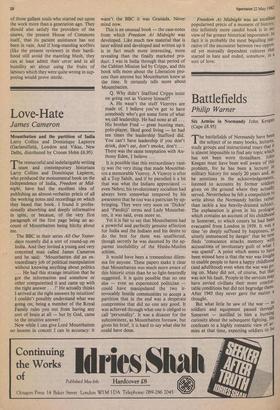Love-Hate
James Cameron
rr he resourceful and indefatigable writing 1 team and contemporary historians Larry Collins and Dominique Lapierre, who produced the monumental book on the Independence of India, Freedom at Mid- night, have had the excellent idea of publishing an almost-verbatim precis of all the working notes and recordings on which they based that book. I found it profes- sionally absorbing and deeply informative in spite, or because, of the very first paragraph of the first page being an ac- count of Mountbatten being bitchy about me.
The BBC in their series All Our Yester- days recently did a sort of round-up on India. And they invited a young and very conceited man called James Cameron and he said: 'Mountbatten did an ex- traordinary job of political manipulation without knowing anything about politics ... He had this strange intuition that he got the information and somehow or other computerised it and came up with the right answer . . .!' He actually thinks I arrived at the right answers by intuition! I couldn't possibly understand what was going on; being a member of the Royal Family rules you out from having any sort of brain at all — but by God, came to the intuitive answer!
Now while I can give Lord Mountbatten no lessons in conceit I can in accuracy: it
wasn't the BBC it was Granada. Never mind now.
This is an unusual book — the case-notes from which Freedom At Midnight was developed. Like much raw material that is later edited and developed and written up it is in fact much more interesting, more revealing than the finally marketed pro- duct. I was in India through that period of the Cabinet Mission led by Cripps, and this book tells more about the Liberation pro- cess than anyone but Mountbatten knew at the time. It certainly tells more about Mountbatten.
Q. Why didn't Stafford Cripps insist on going out as Viceroy himself?
A. He wasn't the stuff Viceroys are made of. I believe you've got to have
somebody who's got some form of what we call leadership. He had none at all ...
His brother Fred — great hunting man, polo-player, liked good living — he had ten times the leadership Stafford did.
You can't have leadership if you don't drink, don't eat, don't smoke, don't ... There was the same temptation with An- thony Eden, I believe ...
It is possible that this extraordinary vani- ty was the very thing that made Mountbat- ten a memorable Viceroy. A Viceroy is after all a Top Sahib, and if he parodied it a bit that was what the Indians appreciated even Nehru; his revolutionary socialism had always been somewhat tempered by his awareness that he too was a patrician by up- bringing. They were very soon on `Dickie' and 'Panditji' terms and Lady Mountbat- ten, it was said, even more so.
Yet it is fair to say that Mountbatten had a powerful and perfectly genuine affection for India and the Indians and his desire to do the best for them was unaffected, though secretly he was daunted by the ap- parent insolubility of the Hindu-Muslim schism.
It would have been a tremendous dilem- ma for anyone. These papers make it clear that Mountbatten was much more aware of this historic crisis than he so light-heartedly suggested. It is quite possible that no one else — even an experienced politician — could have manipulated the two ir- revocably hostile communities to accept a partition that in the end was a desperate compromise that did no one any good. It was achieved through what one is obliged to call 'personality'. It was a disaster for the subcontinent, as Mountbatten foresaw, but given his brief, it is hard to say what else he could have done.
Freedom At Midnight was an excellent popularised precis of a moment of history; this infinitely more candid book is in rnY view of far greater historical importance. In fact it is probably the most beguiling nar- rative of the encounter between two opPos" ed yet mutually dependent cultures that started in hate and ended, somehow, in a sort of love.






































 Previous page
Previous page